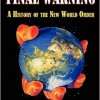Before Our Very Eyes, Fake Wars and Big Lies: From 9/11 to Donald Trump
Thierry Meyssan
Vyjádřené názory jsou výhradně názory autorů nebo komentátorů a mohou, ale nemusí odrážet názory Radios.cz.
World-famous political analyst and editor Thierry Meyssan draws on his last 10 years in the thick of the action in Syria and Libya, where he served personally as an adviser to those governments. In "Before Our Very Eyes," he shares the inside story of the 21st century regime change wars. He lays bare the "Arab Spring," the "revolutions" against Gaddafi and Assad, and the rapid rise of the jihadist monster ISIS, as masked operations of the US empire, "leading from behind." In "Before Our Very Eyes" he chronicles the onslaught against Syria and Libya, from the viewpoints of three camps: the foolish ambitions of the French neocolonialists, the fanaticism of the Muslim Brotherhood, and the lust for world domination of the Anglo-Zionist-American Empire. We see how the Anglo-American axis (the US, UK, and Israel discreetly behind the scenes) deployed their iron grip on the world's money and media to propagate a fake scenario of human rights violations. This was the cover story for the real scheme -- to utterly disable the Muslim world by bringing it under the sword of fanatics like the Brotherhood, Al-Qaeda and ISIS. Vassal regimes like Turkey, Saudi Arabia, Qatar, Jordan and the Emirates were assigned to do the heavy lifting. For public relations purposes, the US pretended to fight half-heartedly against ISIS – which in fact it had intentionally created in Iraq, to divide and conquer the insurgency. The US then covertly ferried the terrorists into Libya and Syria. It continues to prop up ISIS by devious means. Thus the wars on Libya and Syria were based on treachery and fakery from start to finish – but the suffering of millions of innocent victims is all too real. A most murderous masquerade!



